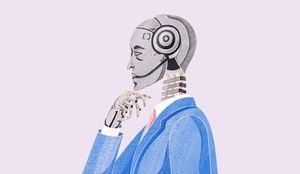Elton John, the legendary music icon, recently stirred the pot with his bold statements against the legalization of marijuana, calling it "one of the greatest mistakes of all time." His remarks came during his feature interview with Time magazine, where he was awarded the title of 2024 Icon of the Year.
At 77, John reflected on his own experiences with drugs, leading to his strong stance on marijuana. He stated, "I maintain it’s addictive. It leads to other drugs. And when you’re stoned—and I’ve been stoned—you don’t think normally." This assertion highlights the personal weight behind his opinion, shaped by years of battling addiction to various substances, including alcohol and cocaine.
The discussion about cannabis legalization remains complex, particularly across North America. While Canada fully legalized recreational marijuana back in October 2018, the situation is still murky in the United States. Currently, marijuana remains illegal on the federal level, categorized as a Schedule I drug by the Drug Enforcement Administration (DEA). Yet, around 24 states plus Washington, D.C., have legalized recreational marijuana, prompting discussions about public health and safety.
Interestingly, John weighed these issues against statistics from the Centers for Disease Control and Prevention (CDC), which indicate approximately 3 in 10 cannabis users may develop cannabis use disorder. These figures suggest potential risks associated with widespread marijuana consumption can’t be overlooked. The CDC adds, though, there's still debate among researchers about whether marijuana is genuinely a "gateway drug" leading users to harder substances.
Looking back, John’s views on drugs stem from his own dark chapter. He previously admitted his struggles with substance abuse and how they impacted not only his life but also his relationships. He candidly mentioned, "You make terrible decisions on drugs," lamenting the pain he caused to others during those years. This self-awareness fuels his advocacy against marijuana; it's not merely academic for him—it’s deeply personal.
John shared the spotlight with other significant cultural dialogues surrounding drug legalization, highlighting the evolution of public opinion on cannabis. Just two decades ago, most people viewed marijuana skeptically, considering it dangerous. A recent Pew Research Center poll indicated over half of the American population favors legalization today, showcasing drastic shifts in mindset and attitudes over time. The Biden administration also initiated discussions for rescheduling marijuana from its current position, potentially as part of the broader reevaluation of its drug policy.
Despite the surging support for legalization, John’s assertions directly oppose this trend. He remains skeptical about the broader societal impacts, firmly believing the downsides of normalization outweigh potential benefits. John's fight against addiction influences his mentality, championing health and sobriety as more valuable pursuits than the fleeting highs of marijuana.
Within the music industry, John isn't alone. He’s been vocal about encouraging fellow artists to avoid drugs, often serving as a mentor to younger musicians grappling with their behaviors. For example, he cited rapper Eminem, whom he sponsored through recovery, demonstrating tangible efforts toward fostering sobriety within the creative community. John also expressed regret over not being able to help his late friend, George Michael, with similar struggles.
With powerful figures like John voicing their concerns, the conversation about marijuana legalization continues to evolve. Advocates champion it for various reasons, including its medicinal properties, potential economic benefits, and social justice initiatives to rectify past marijuana-related convictions. Opponents like John, on the other hand, highlight the addiction risks and social ramifications—elements of substance use often left out of more glamorous legalization narratives.
Even as he tackles these serious issues surrounding marijuana, John's own health struggles add another layer to his advocacy. He has been open recently about facing vision loss due to an infection, affecting his ability to continue creating music as he had. "I can't see anything, I can't read anything, I can't watch anything," he remarked during interviews, a stark reminder of his current battles even amid the celebration of his musical legacy.
All of this culminates to show John’s staunch attitude toward marijuana isn't just rooted in personal pain and addiction; it's also about openly warning society about the realities of substance dependence. Such sentiments create discourse not just about the legality of marijuana but about what kind of culture we want to endorse as we navigate the complex realities of drug use and addiction.
Elton John's remarks resonate with anyone engaging with these pressing societal issues—an intersection of celebrity influence, public health debates, and conversations surrounding recovery and well-being. He intends to use his platform to speak out, reminding us all of the potential dangers of legalization as society shifts toward greater acceptance of substances long deemed taboo.



